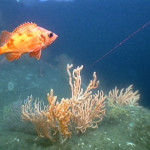You may heard of vegetable coops, meat shares and perhaps even fish shares, now NOAA is advocating “catch shares” for western US fishermen. People can buy in to a particular cooperative harvest each season, ensuring that farmers and fishermen get a fair price for their products. Farmers often practice better farming/harvesting methods that hopefully raise overall food quality. Catch shares are quotas that fishermen can voluntarily accept that are intended to limit bycatch, promote individual responsibility for maintaining the quota, and release pressure from overfished species by encouraging less fishing. According to the Associated Press article “catch share gets rid of the traditional race for fish”, leaving the decision of when to fish up to the fishermen.
The catch share system has been in place before and the research points to increasing groundfish stocks. Small boat, hook and line fishermen form Cape Cod, Massachussetts were the first in the US to adopt the catch share program.
“We were almost like the canary in the coal mine,” said Eric Brazer, sector manager for the Cape Cod Commercial Hook Fishermen’s Association, which went to catch share in 2004. “We’ll live within the limits set by science. Other fishermen are willing to go toe-to-toe with the scientists. We’re most interested in preserving our community and making sure we get through the next few years till we start seeing the fish populations come back.”
Not everyone in the 120-boat West Coast groundfish fleet will be a winner under the new rules. An analysis estimates 50 to 70 boats will be left with fishing permits after things sort out. The remainder will have to stop groundfishing.”
One thing that worries me is who decides who gets to fish? If 50% of the boats get docked, 50% of the work force is unemployed. Do you have any thoughts about this? Perhaps some more knowledgeable than I can chime in on how it all works. Is there any program for dealing with the unemployed fishermen? Many of which are no employable outside of the fishing industry. Regardless, it is an interesting program that I will be watching attentively and shows promise for rebuilding diminished stocks to whet the American appetite.






Perhaps go by seniority.
I believe they are assigned according to each boat’s history of landings. I think a lot of fishermen would love to fish under this kind of system, if they could be sure they would get a share, which is not guaranteed.
I agree that it seems like a good system, but it sounds like it will also put fishermen out. What is in place for them if they can’t get a piece of the share? Do they just go about fishing the other way, or not at all?
If a fisherman qualifies for a share one year, do they still retain that share in subsequent years?
Although there may be 120 vessels that participate in the fishery it is unclear how many of those vessels depend on the groundfish fishery as their main source of income. Just because 50% of the vessels will not get a piece of the pie, it does not necessarily mean all those vessels will be forced to retire. Although some surely will. As with all catch share schemes, including individual quotas and sector quotas, the difficulty is in allocating the quota. This is usually done by catch history although it doesn’t have to be. Auctions could be used as an alternative. Each fishery is different and any catch share program should be set up to best fit that particular fishery.
Regarding year-to-year allocations, yes, the shares are generally retained by the allocation owner for consecutive years. This is one of the features of the program that make it very attractive. Fishermen are able to better plan investments in their business because they have better assurances of what their income will be over longer periods of time. Banks may be also more willing to lend money if a fisherman has been assigned an individual quota share. However, managers often have the ability in the management plan to re-visit quota allocations to ensure that the quotas are getting utilized according to management objectives. There is some contraversy over whether or not an individual/group should be allowed to obtain quota and not fish it. As a public resource it could be argued that the quota should be fully harvested for the good of the nation (e.g., increase jobs and domestic food supply). I’ve rambled enough. Much more will be coming out of the Administration’s Catch Share Task Force (http://www.nmfs.noaa.gov/sfa/domes_fish/catchshare/index.htm).
i have been reading your blog for a bit now, just wanted to say thanks for this. and i have am subscribed to your RSS feed. look forward to reading more from you